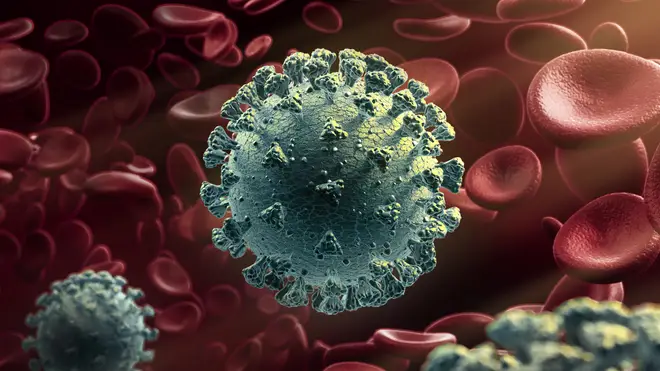
James Hanson 4am - 7am
19 December 2020, 21:41 | Updated: 19 December 2020, 21:45

A new coronavirus variant has swept across London and the South East and is spreading faster than the original strain.
The government's chief scientific adviser, Sir Patrick Vallance, warned that the new Covid variant was becoming the dominant strain following a rapid rise in cases in recent days.
Stood next to him at Downing Street's Saturday press conference was England's chief medical officer, Professor Chris Whitty, who said the new variant can spread more rapidly.
Its rapid transmission through the region has led to London, the South East and parts of Eastern England being plunged into new Tier 4 restrictions from Sunday morning.
So what is the new mutant form of coronavirus? Where is the new variant prevalent? And are there different symptoms?
Read more: London and SE enter Tier 4 and told to stay home over Christmas
Explained: What is Tier 4 and which areas are going into toughest measures?

The spread of Covid is now being "driven by the new variant"
The new strain is a mutation in the SARS-CoV-2 virus that has been at the heart of the UK's coronavirus outbreak.
It has been named VUI-202012/01, the first variant being investigated by Public Health England (PHE) in December.
There are currently about 4,000 mutations in the spike protein gene.
Read more: 'Christmas bubbles' only allowed on Xmas Day, PM announces
Read more: Scotland announces travel ban with rest of UK
Read more: Christmas Day mixing in Wales despite lockdown from tonight

Londoners give thoughts on cancelled Christmas plans and Tier 4
Although the new variant is spreading faster, and therefore harder to control, there is currently no suggestion that it is more deadly or causes more sever symptoms.
There have also already been various mutations of Covid-19 that have enter communities with no real consequence.
However, Prime Minister Boris Johnson said that early analysis showed the new strain could increase the reproductive rate by 0.4 or more and that it may be up to 70 per cent more transmissible than the old variant.
Sir Patrick confirmed this, saying the variant had a "significant substantial increase in transmissibility".
New strains are not always necessarily a bad thing and it could even be less virulent, but if it spreads quicker and has the same severity then more people will become ill in a shorter period of time.

Boris Johnson announces Christmas mixing rules
Prof Whitty said that there is no current evidence to suggest the new strain causes a higher mortality rate or that it affects vaccines and treatments.
However, he said that "urgent work" was under way to confirm this and warned that it was "more vital than ever" that people continued to take action to reduce the spread of the virus.
Health Secretary Matt Hancock also said the latest clinical advice is that it is highly unlikely that this mutation would fail to respond to a vaccine as it produces antibodies against many regions in the spike protein.
But PHE said this new variant includes a mutation in the spike protein and that this may result in the virus becoming more infectious and spreading more easily between people.

Lockdown announcements so close to Christmas are 'absolutely ridiculous', Scottish resident says
PHE said that, as of 13 December, 1,108 cases with this new variant had been identified, predominantly in London and the South East of England.
Sir Patrick said that by December over 60 per cent of infections in the capital had been confirmed as the new variant, saying: "It moves fast and is becoming the dominant variant."
Prof Whitty added that there was a risk of the variant "going out to other areas of the country where it currently is not a problem".
However, he said measures such as social distancing and limiting contact would help prevent its spread throughout the UK.

Boris Johnson announces Tier 4 restrictions for London & South East
Prof Whitty said there was nothing to indicate that the new mutation causes different symptoms to the original strain.
He also said testing for it remains the same and that the clinical outcome is no different for this variant.
The NHS also confirmed the new strain produces the same symptoms, meaning people will still experience a high temperature, a persistent cough, a loss of taste and smell or any combination of all the above.
Listen & subscribe: Global Player | Apple Podcasts | Google Podcasts | Spotify